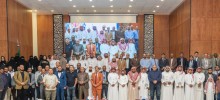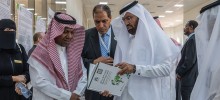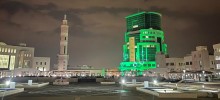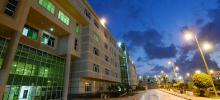The role of dialogue in the face of calls for extremism and terrorism is within the media and terrorism conference sessions.

The sessions of the second international conference, media and terrorism: the means and strategies, which is being hosted by King Khalid University, during the period from 7 to 9 of this month, have presented many research papers. The first paper is titled "general framework to confront extremism and terrorism." It was presented by the Secretary - General of the King Abdullah Global Center for Dialogue among Followers of Religions and Cultures, who is also the Secretary-General of the King Abdul Aziz Center for National dialogue, His Excellency, Mr. Faisal bin Abdurrahman bin Muammar. In his presentation, Mr. Muammar said that terroristic thoughts and its symbols exploit religious texts inappropriately for the dissemination of extremist ideas by simplifying very complicated religious and political issues. He added that by that simplification, holders of extremism ideology were enabling the mobilization of followers, especially from some categories of the society which have less education and culture. In contrast, the principle of dialogue is based on the recognition of the complexity and multiple dimensions of social and political problems and it seeks to uphold the principle of moderation by opening the door to cross-fertilization of ideas and opinions. Mr. Muammar explained that his scientific paper was intended to review the role of the principle of dialogue in the face of terrorism, through exposing the falsehood of intellectual perspectives of terroristic groups. The paper contained discussions on the postulates from which the principle of dialogue springs, in comparison with intellectual discourse for terroristic groups. He pointed out that the second part of the paper dealt with the role of dialogue, whether at the local or at international level, in the face of calls for extremism and violence, based on the actual experiences of the King Abdul-Aziz Center for National Dialogue, and King Abdullah Global Center for Dialogue among Followers of Religions and Cultures. The paper concluded with concluding remarks about the role of dialogue in the face of calls for extremism and terrorism in traditional and new media methods.
For his part, a media and the academic advisor, Dr. Hamza bin Ahmed Bayt Al-Mal, provided a worksheet titled "conceptual framework of the Kingdom's efforts in the face of the thought of extremism and terrorism: the statue of intellectual and media efforts." In his worksheet, Dr. Hamza clarified that the vast efforts of the Kingdom of Saudi Arabia to confront the ideology of extremism and terrorism have been launched after the events of September 2001, being the most prominent global event which put the Kingdom at the center of world events. Dr. Bayt Al-Mal stressed that it was clear from the onset that it was very dangerous, and that treatments must take multiple paths: first to determine the reasons, and then move them to treatment programs and, secondly, to rebuild the image and the global reputation of the Kingdom, which was destroyed by the events. He explained that that study sought to provide a descriptive summary of the state of intellectual and media treatments in the Kingdom of Saudi Arabia (KSA), through a conceptual framework that illustrates the general direction to deal with the thought of extremism and terrorism. This framework includes a set of efforts in multiple areas: legislative, judicial, executive, financial, security, as well as intellectual and media efforts - subject of this paper. As an important step to building a conceptual framework. That requires an explanation of the components of the conceptual framework and its components, and it explains each component and treatment strategies. The paper showed that there are multiple efforts, but they lacked follow-up and scientific studies to assess the situation, in particular, intellectual and scientific, and media efforts. It was also noted that the majority of the treatment efforts were limited to intellectual legitimacy, neglecting the rest of treatment aspects, in addition to the lack of applied studies, weaknesses, and poor quality, and that most of them were made at scientific conferences or in academic dissertations.
With regard to media efforts, Dr. Hamza explained that they often cover the events. Unfortunately, these efforts were deflected to increase internal ideological dispute over the ideology of extremism and terrorism groups, except some efforts on radio and television, such as allocating specific programs, for example the program "our concerns", which was the only program that gave many of the entrances to the intellectual treatments and in particular that it was hosting some young people who were involved in terroristic acts. There were also some dramas, whether by allocating one of its episodes for terrorism or an episode in a drama series.
Dr. Hamza indicated that on the side of the means of social networks, it was observed that there were not specialized accounts, except "Sakena" campaign in the KSA, which was managed by specialists, and which applies methods that outweigh extremist groups methods; first to protect young people from falling into the clutches of ideological extremism, and secondly to debunk what was promoted by these organizations (following the footprints of "Sawap" center in the United Arab Emirates to fight Daish in Twitter).
Next was the turn of, Dr. Sean Bowers and Nagham Al Karhili from the University of Virginia State, who submitted a worksheet entitled "Bridging or expanding the gap: Islamic civil society's curricula in building social resilience and the fight against violent extremism." In their worksheet, the two researchers said that over the last decade, the strategy of preventing global violent extremism has made concrete efforts to stop recruiting Muslims, in order to create a civil society of Muslims. Since then, the idea of the involvement initiative of the Muslim community appeared to be strengthening the silent majority. The two researchers stressed that a research study conducted by the prevention of violent extremism campaign in Britain in 2011 made it clear that there are attempts being made to incite hostility against Muslim communities to isolate them, which is the same as the findings of the Organization for Security and Cooperation in Europe in a review of the initiative in 2014. The two researchers further discussed the role of religion in international affairs, by examining the role of non-governmental organizations that focus on Muslims development in metamorphic areas affected by conflict, because such networks represent the core components of the initiative of combating violent extremism and stability in post-conflict situations, whether in the short, medium or long term.
The scientific paper depended on 30 interviews with representatives of Islamic civil society organizations and representatives of the Global Initiative; and explained that in spite of the slack that hit the central role played by Islamic non-governmental organizations in terms of governance, policy makers and representatives should view them as an untapped source, not only in the global war on extremism, but in the post-conflict strategies. The study showed how those Islamic organizations with a moderate attention and with an effective media training, could show their humanitarian core successes subjected to the same people who had been a prey to extremists. The scientific paper concluded by showing how these strategic stories can be effective in challenging the ideological ideas.
After that, Prof. Muhammad Mukhtar, from Technology Mara University, in Malaysia, presented a worksheet, titled "Confronting terrorism through religious, cultural, legal and ethical values." In his worksheet, prof. Mukhtar mentioned extremists' methods to achieve political, religious and ideological agendas. He stressed that he and other concerned people felt sorry about civilians who were easy targets for terrorists. Prof. Mukhtar also clarified that the terrorists thought that they were above the law, so they were not working under a moral or legal framework, such as is the case with the regular army. In that case, the size of the atrocities they commit was worse than that committed by ordinary criminals. He further explained that terrorists use religion as a tool in the market of ignorance to commit the most heinous crimes in the name of religion; the terrorists design programs to attract criminals. So, there is a need for a tool or a program that could overcome their programs, and here lies the role of the law, which has proved globally as an effective way to overcome terrorism if it was linked to morality. The researcher pointed out that the history of wars in the most virulent wars took into account morality in spite of differences; civilization could easily be driven by extremist ideas, if not control, which leads to prosperity in extremist ideas.
Regarding solutions, Dr. Hamza has stated that the best solution was to combine the efforts of religion, civilization, law, and ethics, to fight terrorism elements. Here, the media is a prime component to achieve this requirement because it can be harnessed whether as means for or against such efforts that are in the fight against terrorism. He stressed that if media was misused, it would create more terrorists. In contrary, if media was used effectively, that would reduce their - the extremists -number.
At the end of the second session, Dr. Amna Sultana, from Al Haj Lakhdar University, presented a worksheet about the role of administrative measures and actions in the fight against terrorism - Study the experience of Algeria and Saudi Arabia. Dr. Lakhdar showed that most of the Arab legislation, including the Algerian and Saudi Arabian legislation, talked about the importance of prevention of terrorism in the communities as a continual process that have priority to the development and upgrade of community activities.









